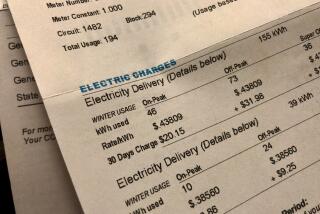PacBell Offers to Give Up Monopoly on Local Toll Calls
- Share via
Pacific Bell on Tuesday proposed letting long-distance carriers such as American Telephone & Telegraph, MCI Communications and US Sprint offer local toll service in California for the first time.
But Pacific Bell, the state’s largest local phone carrier, also laid out “several important conditions” that would first have to be satisfied before it would willingly give up its monopoly.
“More competition is inevitable,” said Gary W. McBee, Pacific Bell executive vice president. But, he added, “Pacific Bell would like to see an orderly transition.”
The proposal by Pacific Bell was part of an opening round of official debate on how to end the monopoly on local toll calls, a process that is expected to cut phone rates and provide greater choices for consumers.
The proposal was among more than a dozen position papers filed with the state Public Utilities Commission in San Francisco on Tuesday, marking the start of the PUC’s long-awaited inquiry into local competition.
The state’s second-largest carrier, GTE California, filed a similar proposal with similar qualifiers, said Tim McCallion, director of revenue management for the Thousand Oaks-based firm.
While Pacific Bell and GTE California have previously acknowledged that competition in some parts of the local market is inevitable, and even desirable, Tuesday marked the first time that they put forth specific proposals for doing so.
AT&T; predicted in its filing that competition would benefit customers by bringing “immediate significant reductions” in present local toll charges. As an example, it cited the present local toll of $1.23 for a five-minute call between San Francisco and San Jose, a distance of 41 miles. A similar call between Los Angeles and San Francisco, traveling 351 miles, costs $1.06. The shorter call reflects Pacific Bell’s current monopoly while the longer one is subject to competition, it pointed out.
Pacific Bell and GTE California conditioned their similar offers with significant restrictions. For one, they said, anyone wanting to use some other carrier than the local company will have to dial the long-distance firm’s five-digit access code--for example, 10288 in the case of AT&T--then; the local number.
Not to be opened to competition, the companies emphasized, is the monopoly on handling local calls whose cost is included in a customer’s basic monthly service charge, currently $8.35 for Pacific Bell customers. These are currently limited to calls covering less than 8 miles, but the PUC has already ordered that the area be expanded to 12 miles later this year.
Mark Barmore, an attorney with Toward Utility Rate Normalization, a coalition of consumer advocacy groups that specializes in regulatory issues, said TURN does not oppose competition on the local level. Its concern will be on the conditions that the PUC eventually imposes, he said.
Barmore said TURN worries that the PUC will allow the local companies to change their prices--lowering local tolls, for example, but increasing charges for other services--before taking a hard look at the effects that increased competition might have on overall revenues. For example, he said, lower long-distance prices led to increased business for AT&T; and other carriers.
About a dozen other states already offer some degree of competition for local toll calling, but California’s $2-billion-a-year local market is by far the nation’s largest and will be closely watched, Pacific Bell’s McBee predicted.
The PUC set Feb. 20 for comment on the proposals. Presumably, public hearings would follow, leading to a commission ruling later this year.
More to Read
Inside the business of entertainment
The Wide Shot brings you news, analysis and insights on everything from streaming wars to production — and what it all means for the future.
You may occasionally receive promotional content from the Los Angeles Times.










